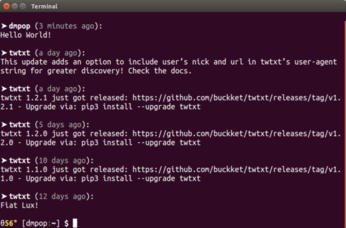twtxt: Microblogging for Hackers

Productivity Sauce
Maybe you are not keen on using closed and tightly-controlled third-party microblogging services like Twitter. Or maybe you are just looking for a straightforward way to share your thoughts with the world directly from the command-line. In either case, twtxt might be something right up your alley. This little tool makes it possible to push updates and follow other twtxt users from the convenience of the terminal. The clever part is that twtxt stores your updates in a plain text file. Make this file publicly accessible via HTTP and other users can subscribe to your stream.
twtxt is written in Python 3, and the easiest way to install it on your system is through the PIP tool. To do this on Debian and Ubuntu-based Linux distributions, run the following commands as root:
apt-get install python3-pip pip3 install twtxt
Run then the twtxt quickstart command to configure basic settings, and you are good to go. twtxt features a handful of simple commands. To post an update, use the twtxt tweet command followed by the update message, for example: twtxt tweet "Hello World!". The twtxt timeline lets you view your stream, while the twtxt view twtxt shows the feed of the specific user (twtxt in this case). To follow another twtxt user, use the twtxt follow twtxt https://buckket.org/twtxt_news.txt command (you need to replace the example user and path with the actual values). For further info on using twtxt, head over to twtxt documentation. And if you want to follow yours truly, I'm dmpop and my twtxt URL is http://dmpop.dhcp.io/twtxt.txt.
comments powered by DisqusSubscribe to our Linux Newsletters
Find Linux and Open Source Jobs
Subscribe to our ADMIN Newsletters
Support Our Work
Linux Magazine content is made possible with support from readers like you. Please consider contributing when you’ve found an article to be beneficial.

News
-
Chaos Comes to KDE in KaOS
KaOS devs are making a major change to the distribution, and it all comes down to one system.
-
New Linux Botnet Discovered
The SSHStalker botnet uses IRC C2 to control systems via legacy Linux kernel exploits.
-
The Next Linux Kernel Turns 7.0
Linus Torvalds has announced that after Linux kernel 6.19, we'll finally reach the 7.0 iteration stage.
-
Linux From Scratch Drops SysVinit Support
LFS will no longer support SysVinit.
-
LibreOffice 26.2 Now Available
With new features, improvements, and bug fixes, LibreOffice 26.2 delivers a modern, polished office suite without compromise.
-
Linux Kernel Project Releases Project Continuity Document
What happens to Linux when there's no Linus? It's a question many of us have asked over the years, and it seems it's also on the minds of the Linux kernel project.
-
Mecha Systems Introduces Linux Handheld
Mecha Systems has revealed its Mecha Comet, a new handheld computer powered by – you guessed it – Linux.
-
MX Linux 25.1 Features Dual Init System ISO
The latest release of MX Linux caters to lovers of two different init systems and even offers instructions on how to transition.
-
Photoshop on Linux?
A developer has patched Wine so that it'll run specific versions of Photoshop that depend on Adobe Creative Cloud.
-
Linux Mint 22.3 Now Available with New Tools
Linux Mint 22.3 has been released with a pair of new tools for system admins and some pretty cool new features.

